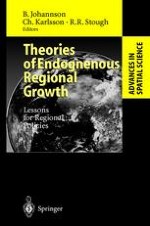2001 | OriginalPaper | Buchkapitel
Locational Advantage and Lessons for Territorial Competition in Europe
verfasst von : Ian Gordona, Paul Cheshire
Erschienen in: Theories of Endogenous Regional Growth
Verlag: Springer Berlin Heidelberg
Enthalten in: Professional Book Archive
Aktivieren Sie unsere intelligente Suche, um passende Fachinhalte oder Patente zu finden.
Wählen Sie Textabschnitte aus um mit Künstlicher Intelligenz passenden Patente zu finden. powered by
Markieren Sie Textabschnitte, um KI-gestützt weitere passende Inhalte zu finden. powered by
Two significant consequences of the pervasive economic changes of the past 25 years or so, associated with internationalisation if not actually globalization1, involve substantial increases in the intensity of competition, and in the economic importance attributed to place (i.e. to specific spatial externalities). In both cases, it is also argued that qualitative factors (involving the presence or absence of multiple qualities), rather than simply availability and price, have come to play an increasingly important role. Thus Porter (1990)2 argues both that traditional concepts of comparative advantage are inappropriate to a world in which quality competition prevails, and that qualitative attributes of a firm’s national and city-regional environment play an important role in enabling it to develop competitive advantage. A natural corollary is to expect the growth of forms of inter-place, or territorial competition, involving attempts to boost local economic performance through collective efforts to enhance qualitatively significant attributes of particular places — which would be relatively new to European cities and regions, if not in the United States. Even Krugman (1996) who has argued strongly that competitiveness is an attribute of firms not of collectivities, recognises that the role of agglomeration economies makes spatial outcomes potentially dependent on chance or governmental influences operating at an urban-regional (or national) scale. Since there is in this situation no unique equilibrium outcome, ‘an intellectually respectable case’ can then be made in support of selective interventions as a means of boosting local real incomes — though Krugman is suspicious that such cases will usually turn out to be unwarranted pieces of special pleading on behalf of more specific interests.
